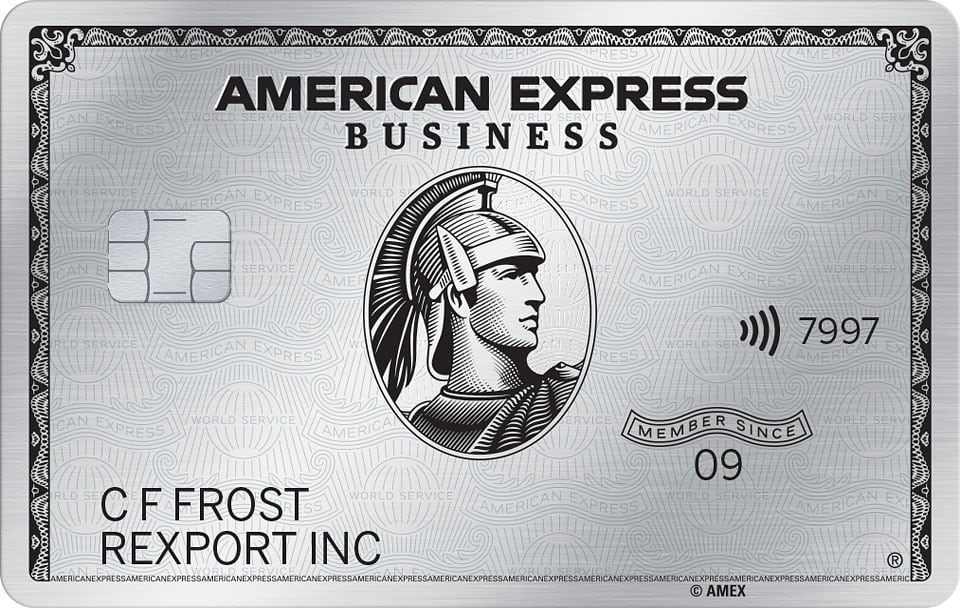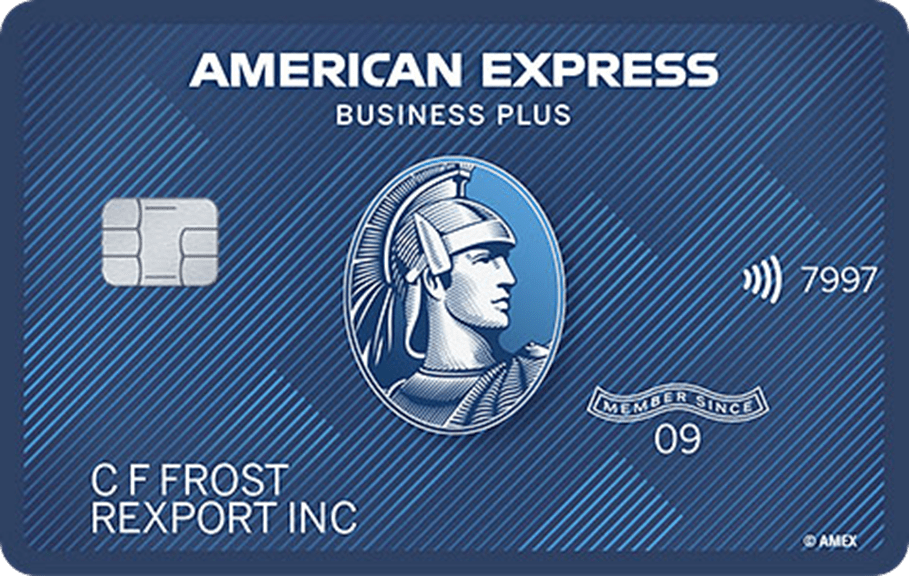MileValue is part of an affiliate sales network and receives compensation for sending traffic to partner sites, such as CreditCards.com. This compensation may impact how and where links appear on this site. This site does not include all financial companies or all available financial offers. Terms apply to American Express benefits and offers. Enrollment may be required for select American Express benefits and offers. Visit americanexpress.com to learn more.
Note: Some of the offers mentioned below may have changed or are no longer be available. You can view current offers here.
You might be wondering why do you need business credit cards? Or maybe you think you can’t qualify for one because you don’t own what most people would perceive as business? There are a lot of misconceptions about what qualifies as a business, who is eligible and how to apply for these cards.
However, business cards often come with some of the most attractive welcome offers and have the most generous earning structure. They can prove to be extremely rewarding for anyone who is willing to learn and understand the rules. You can effectively double your points and miles earning potential because there are quite a few cards that offer both a personal and a business version.
Let’s look at some of the most common questions our readers ask when they are considering applying for the business credit cards.
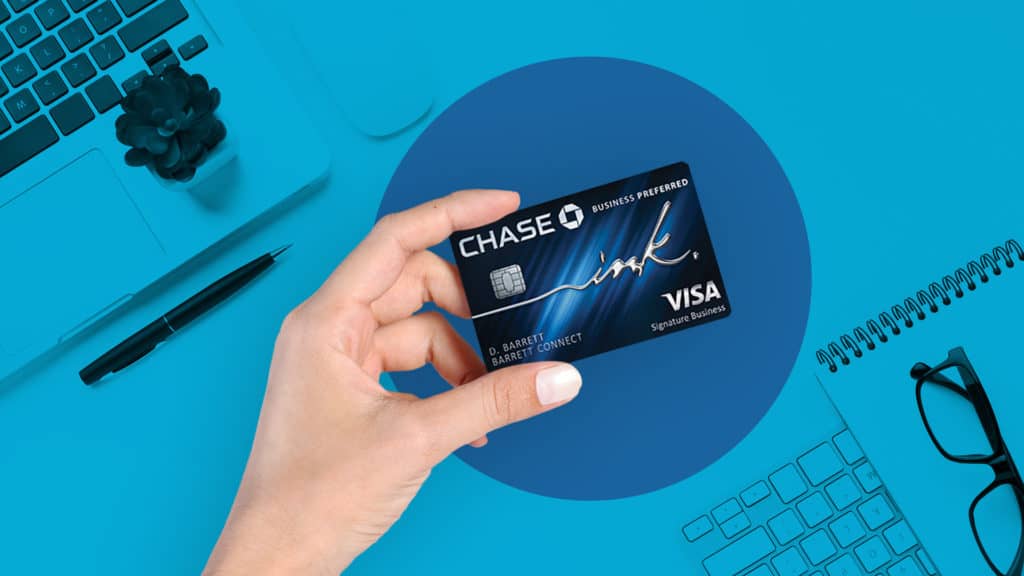
I don’t think I have a business. Am I still eligible for business credit cards?
Many people assume they aren’t eligible for business credit cards because they think that they don’t own a business. What’s the first thing that comes to mind when you think business? Some kind of physical location with employees, like a restaurant, retail store or at least an LLC with a tax ID number?
In reality, many people have a business without realizing it. There are no written laws or internal banking rules that determine what or who qualifies for a business credit card. So, in theory, anyone can apply for one.
Examples of Businesses You May Be Already Running
Most people don’t consider their side hustles a business. But those side hustles actually ARE businesses. After all, you are engaged in them with the intent to generate profit and don’t consider them to be simply hobbies. So here are a few examples:
- Seller on eBay, Amazon or Etsy
- Seller at consignment shops
- Seller at yard sales
- Seller of baked goods or cake decorating
- Seller of souvenirs from your trips abroad
- Blogger
- Seller and collector of coins, stamps, or coins
- Drive for a rideshare service such as Uber or Lyft
- Own or manage rental properties
- Babysitting
- Dog walking
- Consulting
- Many forms of 1099 work (including “day jobs” for many people)
- Manual labor on the weekends, such as yard work or being a handyman
- Performing in a band
- Freelancing online
As you can see, this is quite a long list, and it’s far from being comprehensive.
Free Credit Card Consultations
Unsure as to whether your personal situation qualifies
you for business credit cards?
Fill out a Credit Card Consultation Request. We’ll analyze
your specific situation and figure out what is the next move
that is best for you.
Do I need a tax ID or an EIN to apply for a business card?
The short answer is no, you don’t need an EIN (Employer Identification Number). You can just use your Social Security Number in place of EIN. If you already have an EIN, or were going to apply for one anyway for other reasons, sure, go ahead and use it, but you definitely don’t need one in order to qualify for a business credit card.
If you do have a tax ID when you are applying for business cards, make sure that the business name used on the application is the same name listed on the business registration documents.
Do I Need to Have Employees or Be an Incorporated Business?
No, you don’t need to have employees. Think about various service providers and businesses you might be using. Does your dog walker have employees? Or someone who bakes and decorates birthday cakes in your neighborhood? Do they have other people working for them? Even a one person business is a real business. This is called sole proprietorship and the owner is a sole proprietor.
Do I Need to Have Profits in My Business to Be Eligible?
The short answer is no – the only thing separating a hobby from a business, is the intent to make a profit.
One generally accepted rule is that you need to be engaging in some sort of activity with the intent of making a profit. The key word here is intent. We’ve all seen headlines of big, and I mean really big multimillion dollar businesses, not making a cent of profit. And often just the opposite is true! And yet these companies are still eligible for business banking products.
How Do I Apply for Business Cards as a Sole Proprietor?
Again, just to reiterate, if you are applying for a business card without a registered business, you are applying as a sole proprietor. In order to maximize your chances of approval, you need to get a few key things right so make sure you follow the steps we outlined here.
What’s My Business’s Name?
When you are applying as a sole proprietor, your business name is your legal name. That’s it, super easy! Don’t add anything to your name, I am not Anna Zaks Consulting, I am just Anna Zaks.
What’s My Business Revenue?
This is the amount of revenue this business activity brings in, or is expected to bring in, per year. Please note that this is revenue, not profit.
What Is My Tax ID and Business Address?
Your tax ID is your Social Security Number, unless you already have an EIN, and your business address is your home address.
What is Time in Business?
How long have you been engaged in your money-making activity/business? It’s ok if it’s just a short period of time.
What is Type of Business?
Sole Proprietor
What Do I Choose for the Business Industry?
Whichever category fits the best. It’s often not a perfect fit, but close enough is good enough.
What is My Role?
You are the owner. Not a president or a main shareholder, just choose Owner from the drop down menu.
What Is the Personal Information Part
Each business card application will have a personal information part. Filling it out should be pretty straightforward. Use the same information, such as household income as you’d use for a personal card application. It’s ok that your business address and your home address are the same.
I Submitted My Business Card Application, Now What?
It depends. Sometimes you’ll get instant approval and sometimes the application will go into pending. If you don’t get approved on the spot, there’s no reason to panic, it happens quite often with business cards. If the bank wants more information, they’ll mail you a letter. And sometimes it just takes a little longer for the application to get approved, two to four weeks on average.
If your application is denied, you can call the reconsideration line and explain the reasons for wanting the card or answer some questions about your business. At this point, it’s up to the phone agent whether your application gets approved or not.
Do Business Cards Have an Impact on My Taxes
No, business cards have absolutely no impact on your taxes. Credit card companies and banks don’t report the spending on your business cards to the IRS.
Will My Business Card Show Up on My Credit Report?
When you apply, the bank will pull your personal credit, also referred to as the hard inquiry, but usually business cards don’t show up on the credit report. There are three banks that report business cards to the personal credit report – Discover, TD Bank and Capital One.
This means that opening a business card, even with a high credit limit, will have no effect on your personal credit score, credit utilization, credit history etc. By extension, closing business cards will have no impact on your personal credit report either.
Note that you are still personally responsible for any debt incurred on the card. All charges are guaranteed by you personally and all missed payments will be reported to your personal credit.
Should I Use My Business Card for Business Only Spending
When you see the terms and conditions stating that the card can be used only for business spending, don’t panic. Don’t worry if you have a business that has spending patterns that don’t look like a conventional business. In all my years in points and miles, I’ve never seen a single instance of a bank questioning a charge.
Always pay your bill on time, use the card responsibly and you shouldn’t run into any issues.
Does Applying for Business Cards Affect My 5/24 Status?
As mentioned earlier, most business cards don’t report to personal credit. So what does that mean for Chase’s 5/24 rule? We would still advise you to follow the general credit card and travel rewards strategy and consult our list of the best credit cards, but the fact that your 5/24 status isn’t affected by business card approvals gives you a lot more choices and opens great miles and points earning opportunities.
Even Chase’s own cards don’t count toward 5/24! That doesn’t necessarily mean that Chase will let you open a multitude of their own business cards in a short period of time, but it does open doors to great business cards with very generous welcome bonuses.
One important caveat, you do have to be under 5/24 to get approved for a Chase business card, but once you are approved, that card won’t count toward the five card maximum.
The Best Business Credit Cards
There are so many excellent business cards, some have no annual fee and some come with hefty fees but also lots of perks and benefits that help offset the annual fee.
Chase Ink Business Preferred® Credit Card
The Chase Ink Business Preferred is one of our favorite small business cards. It comes with a huge 100,000 Ultimate Rewards welcome bonus after you spend $15,000 in the first three months. The card has a very modest $95 annual fee.
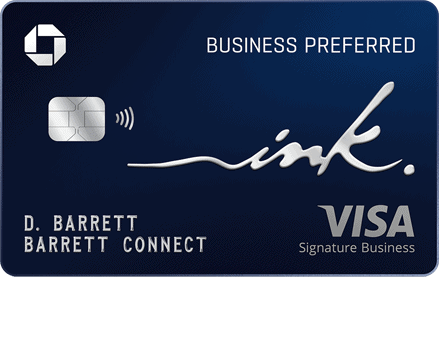
Chase Ink Business Preferred® Credit Card
90,000 bonus points after you spend $8,000 spend in 3 months.
The card earns 3X on the first $150,000 spent in combined purchases on travel, shipping purchases, internet, cable and phone services, and on advertising purchases made with social media sites and search engines each account anniversary year and one 1X on everything else.
The extremely valuable Ultimate Rewards points can be transferred to partner airlines and hotels, such as Hyatt or United, or redeemed through the Chase Travel portal at 1.25c/point. So the welcome bonus of 100,000 points is worth $1,250 toward travel.
The card has no foreign transaction fees, perfect for any business owner that loves to travel.
Chase Ink Business Cash® Credit Card
The Chase Ink Business Cash no annual fee card is a great companion to the Chase Ink Preferred card. It comes with 75,000 Ultimate Rewards or $750 welcome bonus and earns 5X on the first $25,000 spent in combined purchases at office supply stores and on internet, cable and phone services each account anniversary year. The card also earns 2X on the first $25,000 spent in combined purchases at gas stations and restaurants each account anniversary year.
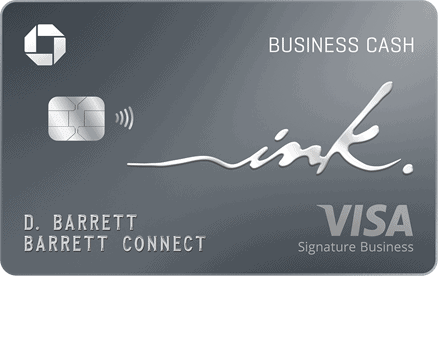
Chase Ink Business Cash® Credit Card
Earn $350 when you spend $3,000 on purchases in the first three months and an additional $400 when you spend $6,000 on purchases in the first six months after account opening
Ultimate Rewards points earned with Ink Business Cash can be redeemed as cash back, or if you have any of Chase’s premium cards (a card with an annual fee), including personal Ultimate Rewards earning cards, you can combine the points and redeem them for travel rewards.
The Business Platinum Card® from American Express
The welcome offer and the minimum spending requirement on the ultra premium Business Platinum Card fluctuates. The card earns 5X on flights and prepaid hotels on amextravel.com, 1.5X on eligible purchases at US construction material & hardware suppliers, electronic goods retailers and software & cloud system providers, and shipping providers, as well as on purchases of $5,000 or more everywhere else, on up to $2 million of these purchases per calendar year and 1X on everything else.
The Business Platinum Card® from American Express
Limited Time Travel Offer: Earn 150,000 Membership Rewards® points after you spend $20,000 on eligible purchases on your Business Platinum Card® within the first 3 months of Card Membership. Plus, earn a $500 statement credit after you spend $2,500 on qualifying flights booked directly with airlines or through American Express Travel® with your Business Platinum Card® within the first 3 months of Card Membership. You can earn one or both of these offers. Offer ends 6/30/25.
The real power of this card comes from its benefits:
- 35% points rebate on first or business class flight, or any class flight with your pre-selected qualifying airline
- Up to $200 Airline Fee Credit
- Up to $120 Fee Credit for Global Entry or TSA PreCheck
- Access to Centurion and other lounges around the globe
- $200 in statement credits annually for U.S. purchases with Dell
- Marriott Bonvoy Gold and Hilton Honors Gold Status
The card doesn’t charge foreign transaction fees.
The Blue Business® Plus Credit Card from American Express
This is one of the best business credit cards on the market even though it often comes with little to no welcome bonus. The card earns 2X on the first $50,000 in purchases each year (1x on all other purchases), so it’s possible to earn up to 100,000 Membership Rewards Points each year with this free card!
It’s also a great card to have to maintain your Membership Rewards points in order to keep them active if you ever want to downgrade or cancel a more premium annual fee card like the Business Platinum Card.
The Blue Business® Plus Credit Card from American Express
Earn 15,000 Membership Rewards® points after you spend $3,000 in eligible purchases on the Card within your first 3 months of Card Membership.
Final Thoughts
Business cards often come with very generous signup bonuses and a great rewards earning structure. The good news is, you don’t have to be an incorporated business with employees and high revenue, even small business owners are eligible for business cards.
Most people don’t consider their personal situations to be qualifying enough to open a business credit card or two, but in fact more people are eligible than realize it.
The application process is very straightforward and it’s easy to avoid business card application mistakes if you follow the steps we outlined in this article.
Let us know in comments what business cards you are going to apply for and how you are going to use your newly-earned points and miles.


